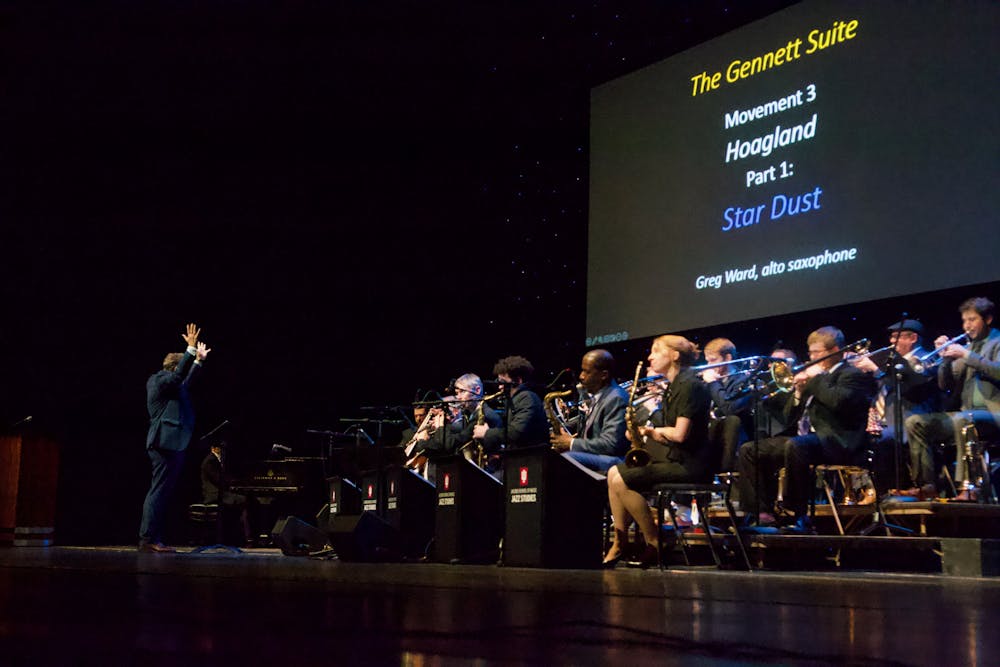IU’s annual Jazz Celebration took place at 7:30 p.m. April 29. The event consisted of a performance by the Buselli-Wallarab Jazz Orchestra, who played “The Gennett Suite,” a tribute to Gennett Records and the seminal recordings it produced.
The piece was composed and arranged by David N. Baker Associate Professor of Jazz Studies Brent Wallarab. The suite aims to highlight the importance of Gennett Records, a Richmond, Indiana-based record label that recorded many of the earliest jazz recordings, including those of Louis Armstrong, Bix Beiderbecke and Bloomington’s own Hoagy Carmichael.
The first movement, “Royal Blue,” focuses on the influence of blues in the early jazz sound, shown through the work of musicians like Louis Armstrong and King Oliver. It was split into four parts, with each exercising a different aspect of the blues sound.
They went on to “Blues Faux Bix,” the second movement, which was inspired by the music of cornetist Bix Beiderbecke. David Brent Johnson, the event’s master of ceremonies, explained that the title references a trend of adding “blues” to the titles of non-blues tunes to increase sales.
Related: [IU student Garrett Fasig to be awarded for Excellence in Jazz Composition]
In following this theme, neither of the movement’s two parts, “Davenport Blues” and “Jazz Me Blues,” fall into the blues form. This movement masterfully combines techniques of composition and arrangement from across time periods, incorporating modern sounds effortlessly with the early melodies.
Professor Wallarab said this suite has been in the oven for a long while, with its first draft being penned twenty years ago. He said he only revisited the piece in 2018 before committing to fully realizing it in 2022, and he thinks that time off was important for its development.
“As a musician, you can keep getting better and better. Even in my late 50s, I feel like I’m still getting better,” Wallarab said. “I’m a better composer than I was 20 years ago, so in that way, [the piece] works even more effectively now.”
After the intermission, Johnson presented the Hoagy Carmichael Award for Excellence in Jazz Composition. The award went to Jacobs School of Music master’s student Garrett Fasig, who said taking Wallarab’s composition classes, as well as playing in his big band, were important for his development as a composer.
“He runs the big band I’ve been playing with for four years, so I’ve gotten to workshop my music with the band and have him advising me in the classes,” Fasig said. “Getting to hear your own stuff is one of the most important parts. Knowing what you wrote versus knowing what it actually sounds like are totally different things.”
The piece’s third movement, “Hoagland,” highlighted the contributions of IU alumnus Hoagy Carmichael to the early jazz idiom. The first part of this movement was an arrangement of his now famous composition, “Star Dust,” which featured lead alto saxophonist and Assistant Professor of Music Greg Ward.
Related: [The heart of retro-pop-indie-soul: Bloomington’s Six Foot Blonde on their upcoming EP]
“It was interesting seeing how this music was captured and who thought it was important enough to document, and especially because it happened to come from Indiana rather than one of the big centers like New Orleans or Chicago or New York,” Ward said.
The fourth and final movement showcased the work of pianist and alleged inventor of jazz Ferdinand “Jelly Roll” Morton. Featuring two of his compositions, this movement took the piece out with all the grandiosity that this music warrants.
Wallarab said the works that inspired “The Gennett Suite” are among the most important in jazz history and that they deserve the sort of reverence shown in his piece.
“I love the original recordings from the 1920s, so first I think you have to have a real love for the source material. I didn’t try to improve upon it, because you can’t; all I could do was be influenced by it,” Wallarab said. “I think any time you’re creating from someone else’s material, you have to really love and respect it.”




